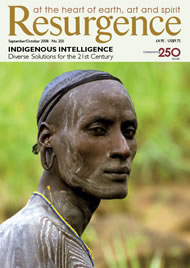MY MOTHER USED to tell me a Jain story when I was a child:
Adam was lost in the jungle, and there he encountered two wild elephants. They began to chase him. In order to escape from these frightening beasts Adam climbed a tall tree nearby, but the elephants were not going to let him go so easily: they curled their trunks around the tree and began to shake it furiously. It so happened that above the branch Adam was holding was a beehive. As the tree shook, honey began to drip down, straight into Adam’s mouth.
At that very mo ment some angels in their chariot were flying past and upon seeing Adam’s desperate plight they slowed down and said, “Come, we will rescue you. Come into our chariot.”
“Oh, how kind of you,” replied Adam. “But please, let me have this sweet drop of honey, and then I will come.”
The angels were kind and patient, and so they waited. “All right,” they said. “You got your honey drop! Come now – be quick.”
“Please, let me have just one more drop,” pleaded Adam.
The angels were astonished. They said, “You are being stung by bees and any time now the elephants will pull the tree down. You greedy fool, you cannot let go of the desire for that drop of honey! Come, this is your last chance. Come now, or we will go.”
“Please, please, let me have one more drop of honey,” said Adam. “It is so delicious.”
The angels waited for a little while longer but in the end they could not draw Adam away from his imminent death, and they left.
INDIGENOUS PEOPLE LIKE Oren Lyons are the angels of our time. They are calling on us to refrain from the momentary gratification of economic growth, which is like the drop of honey. The planet is threatened by global warming, rivers are polluted, rainforests are disappearing, the human population is exploding, biodiversity is diminishing, and traditional cultures are declining – all this in the pursuit of economic growth, so that we can have the sweet drop of consumption.
To sustain our desire to consume we have created a world of monoculture. We have uniformity rather than unity, divisions rather than diversity. We seem to celebrate sameness: wherever we go we are confronted by the same kind of architecture, shopping centres, houses, food, clothes and culture, education and entertainment. Behind the rhetoric of choice and competition, government, businesses and industries promote monopoly, monoculture and sameness.
The vested interest of the established order is good at the use of sweet-sounding words such as liberty, freedom, democracy and sustainability; but their policies and actions lead to the concentration of economic and political power in fewer and fewer hands. Dignity, equity and equality are sacrificed at the altar of global greed.
Traditional cultures which do not fit within the paradigm of economic growth, commercial expansion, consumerism, globalisation and mass production are labelled at best as idealist dreams, lacking realism. Traditional cultures are condemned as underdeveloped and backward. The systems of industrialisation, globalisation and centralisation are proclaimed as symbols of progress and development.
But, one has to ask, where have this progress and development led us? What have the realists and pragmatists achieved? After 100 years of relentless destruction of Nature and culture, where are we now? How can we take satisfaction in so-called progress and development while global wars, global warming and global poverty rage? How can we rejoice in the wealth of the few while millions of men, women and children suffer in hunger and deprivation? How can we rest when biodiversity and cultural diversity are constantly and dangerously under threat?
The time has come to stop and take stock; the time has come to look at the evidence and ask ourselves where we have gone wrong. In spite of the triumphs of science and technology, why do we live in the midst of multiple crises and conflicts?
THIS SPECIAL ISSUE of Resurgence is designed to address these disturbing questions and suggest some answers. In the view of our contributors, the way forward is in the harmonious relationship between ecology and economy; between idealism and realism; between Nature and culture; between environment and development; between tradition and progress; between unity and diversity; and, above all, we need to embrace the paramount importance of pursuing noble ends with noble means.
Thanks to The Christensen Fund, an international foundation committed to supporting biocultural diversity, we have been able to produce this bumper issue and bring many scientists and anthropologists together who are able to articulate the root cause of our crises and offer genuine solutions to our precarious predicament. This generous grant from The Christensen Fund enables us to offer a complimentary copy of this issue to all the participants of the International Union for Conservation of Nature (IUCN) Congress in Barcelona and to the delegates at the Bioneers gathering in California.
SATISH KUMAR







